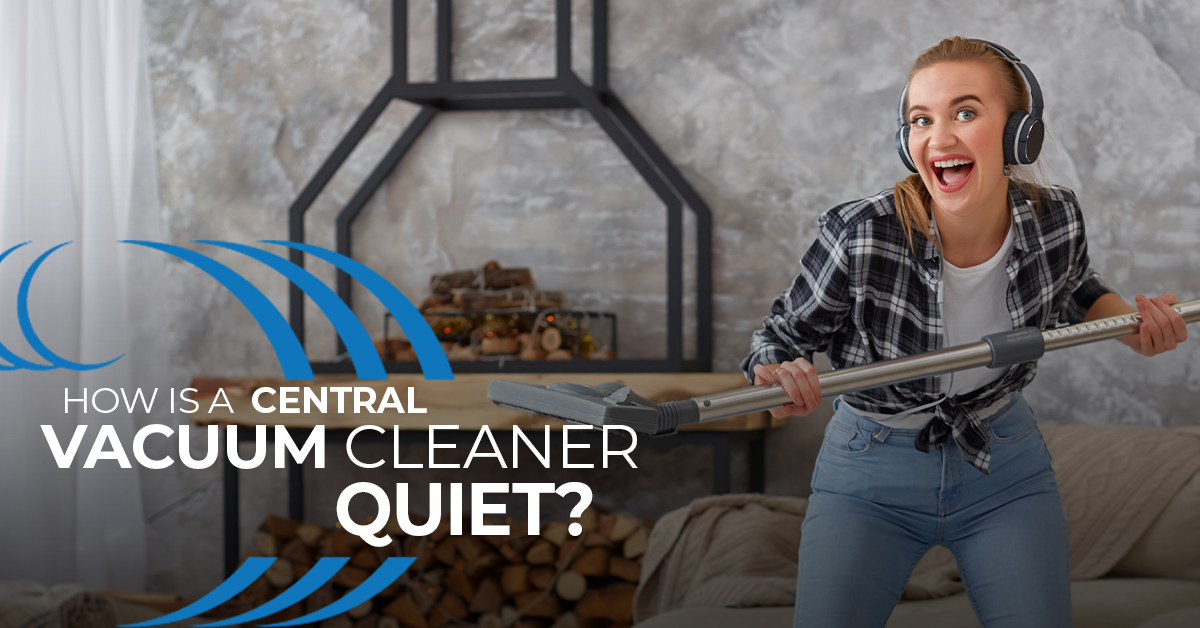
Boosting Productivity in Office Buildings with Central Vacuum
In today’s fast-paced work environment, maintaining a clean and organized office space is crucial for productivity. Office buildings often struggle with keeping their premises clean

A central vacuum system has the ability to function silently, making it possible for you to vacuum without exposing anyone or yourself to loud noise.
Unlike conventional vacuum cleaners that are 70 to 90 decibels loud, most central vacuum systems produce noise at a maximum level of only 60 decibels, or around the volume of two people speaking normally.
Having said that, you may be wondering: “How is a central vacuum cleaner quiet?”
Continue reading to find out what causes a central vacuum system to run quietly and what you can do to keep it that way.
Mufflers are meant to be attached to a power unit’s exhaust and are insulated with a noise-canceling material that lowers sound levels.
Having a muffler on your power unit will help you to hear other sounds like phone rings while you are vacuuming.
Some central vacuum systems are slightly quieter than the typical ones, with maximum sound levels of only 58 or 59 dB. They allow you to clean your entire home without disturbing your loved ones or your neighbors because they are made to operate very quietly.
Dirty filters impair a vacuum cleaner’s ability to suck in air, making the motor struggle and work louder than it should. If you allow this to continue, your motor will overheat and become damaged.
Additionally, it’s important to clean your filters regularly to ensure that they continue to capture debris and improve the air quality in your house.
Typically, vacuum cleaners use one or two filters: a HEPA filter and another one that is placed near the collection bag.
Vacuum filters should be cleaned at least every three months and replaced every six months, depending on how frequently you use your vacuum.
If you’re using a bagless vacuum, dust and dirt can accumulate inside the power unit, clogging the suction motor. Always check and clean the power unit before using your central vacuum system, or use vacuum bags to prevent any dust or debris from clinging onto the motor.
To fix a clogged hose, insert an electrician’s fish tape or garden hose through the hose and carefully push the blockage out. Replace your hose if it has been pierced or torn as it will hinder your vacuum from producing suction.
To remove clogs from the pipes, you can take the following steps:
Letting a bag fill beyond the recommended limit will not give enough space for new debris to enter, cause the motor to get clogged and noisy and decrease the vacuum cleaner’s suction and performance.
The good thing about central vacuum bags is that they are big enough to hold up to 20L of dirt and dust. Depending on how often you use your central vacuum, you only need to change the collection bags once or four times a year to keep your central vacuum cleaner quiet and operating smoothly.
One-time exposure to a very loud sound like an explosion or frequent exposure to loud sounds can damage the sensitive parts in our inner ear, causing tinnitus and temporary or permanent hearing loss.
While prolonged exposure to sounds below 75 dB is unlikely to result in hearing issues, prolonged exposure to sounds at or above 85 decibels can result in hearing loss.
Some conventional vacuum cleaners operate at 85-90 decibels, so using these vacuums to clean your home may not be healthy and convenient for you.
Exposure to loud noises can also lead to additional forms of physical and mental stress, hinder communication and focus, and result in accidents and injuries by reducing your ability to hear warning signals or notice the events that are taking place around you.
It’s important to clean with a quiet central vacuum system because it not only keeps your ears healthy and prevents injuries, but it also allows you to hear other sounds that are necessary to your everyday life.

In today’s fast-paced work environment, maintaining a clean and organized office space is crucial for productivity. Office buildings often struggle with keeping their premises clean

Central vacuums in animal shelters & vet clinic: Explore how these systems boost hygiene, efficiency, and air quality.

In the world of home entertainment, a home theater is a luxury that many homeowners dream of. It’s an immersive experience that brings the magic

A central vacuum system is a significant investment that promises convenience, powerful suction, and improved indoor air quality. However, choosing the right central vacuum hose
Our home automation products are at the forefront of technology, offering a blend of convenience, security, and efficiency. As a Homewave dealer, you’ll be part of a network transforming homes into smart, futuristic spaces.
Embark on this rewarding journey with us and leverage the power of innovative technology.
Please fill out this form and become a Homewave Dealer.